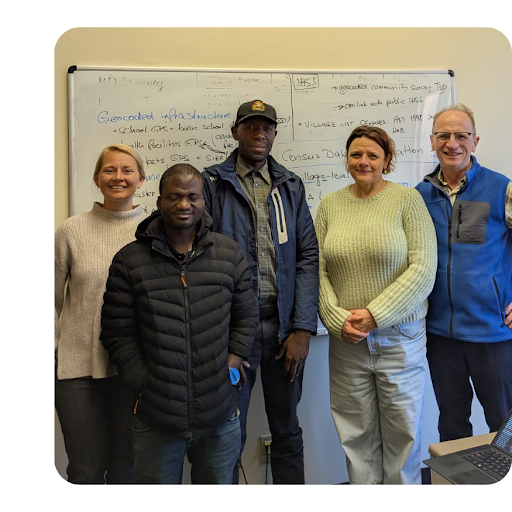This spring on Penn's campus, the Malawi Longitudinal Study of Families and Health (MLSFH) research team welcomed two visitors from Malawi's National Statistical Office (NSO), marking the beginning of a promising partnership.
The visit from NSO representatives Pachalo Chizala and Imran Chiosa was a long-anticipated event aimed at enhancing collaboration between the NSO and MLSFH researchers. “Health is determined by individual behaviors and the contexts in which individuals live. (Pictured: Members of Penn’s MLSFH Team host NSO representatives at a March collaboration meeting held at the University of Pennsylvania. Seen left to right: Helene Purcell (MLSFH) Pachalo Chizala (NSO), Imran Chiosa (NSO), Iliana Kohler (MLSFH), and Hans-Peter Kohler (MLSFH).)
The MLSFH has 25 years of data on individuals; the collaboration with the Malawi National Statistical Office will allow us to complement this remarkable data with contextual data derived from national censuses. The resulting combination of life course behaviors and contexts in the MLSFH will provide unprecedented insights into the determinants of health, and ways to improve the health and aging of individuals in Malawi,” said lead researcher Hans-Peter Kohler.
The NSO collects vital demographic information about their nation's 21.1 million residents, including health statistics such as the 2024 Malawi Demographic and Health Survey (MDHS) Key Indicators Report (KIR). This report is a crucial tool, offering an in-depth look at the country’s health and demographic trends. The survey collected data from over 22,000 Malawian households, covering key areas such as family planning, maternal and child health, malaria prevention, HIV awareness, and nutrition. These findings are important for research in health and development programs, helping Malawi progress toward achieving the United Nations Sustainable Development Goals.
Helene Purcell, an MLSFH & PARC postdoctoral fellow working on the project, stated, “It was such a privilege to spend time with our visitors from the Malawi NSO. Their deep knowledge of Malawi’s data landscape and their openness in sharing insights and resources will have a lasting impact on our research — and on how we think about aging and health in context. Building strong connections and collaborating with Malawian partners is essential to ensuring that our work is locally relevant and impactful.”
The collaboration between the MLSFH research team and the NSO marks a significant step forward in enhancing the quality and scope of health data in Malawi. By integrating NSO's extensive demographic and health statistics with MLSFH's focused research, this partnership promises to yield valuable insights to key populations related to the MLSFH research study. At the same time, working together fosters the overarching goal of achieving sustainable health and development outcomes for Malawi.
By Allison Wright
MLSFH Senior Research Coordinator